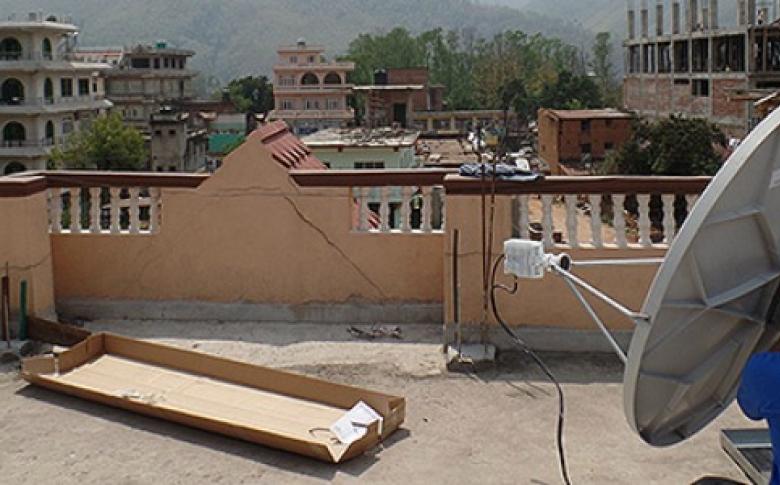
Internet as a Lifeline

ETC and NetHope connect NGO hubs in Nepal
Their excitement was palpable. With the internet connection established by the Emergency Telecommunications Cluster (ETC), humanitarians responding to the Nepal earthquake in Bidur would be able to meet the urgent needs of the affected community better, faster and safer.
"Internet is the basis is of all our coordination," says Daniella Malave, Programme Coordinator with Samaritan's Purse in Bidur. "It's our lifeline."
The ETC in Nepal is providing shared internet connectivity services in seven locations in response to last month's earthquake, with up to eight more planned, depending on the needs of the humanitarian community. The sixth and seventh sites are hubs for Non-Governmental Organisations (NGOs), set-up with ETC members Ericsson Response and NetHope, at the Samaritan's Purse office in Bidur and Médecins Sans Frontières (MSF) office in Arughat.
Internet Essential to Response Operations
"Without communications, we would be severely impaired," says Daniella. "At Samaritan's Purse we have been shifting towards mobile data collection. We depend on the internet to upload and analyse data allowing us to make operational decisions faster, as well as be more transparent with our donors."
In Bidur, Samaritan's Purse is distributing food, shelter kits and other non-food items as well as supporting the Ministry of Health and Population with water, sanitation and hygiene interventions. Under the leadership of the World Food Programme (WFP), ETC shared internet connectivity provided through NetHope and Ericsson Response, will enable Samaritan's Purse and other humanitarian organisations in the area to coordinate and respond better.
"With the internet, we can communicate with headquarters to swiftly make decisions, or with heads of different districts and other NGOs to coordinate the response," says Daniella. "It is crucial that we all have access to the same information, and work from the same information, to avoid duplication and ensure the best response possible."
Better Services through Partnership
NetHope, a consortium of 43 NGOs, has been a member of the ETC since 2010. Just last month, NetHope also became a Stand-by Partner meaning that their personnel and technical expertise can be officially called upon to deploy as part of ETC surge teams in emergencies.
"The cooperation amongst all partners within the ETC is fantastic and it really shows how a cluster should work - all as one big team," says Gisli Olafsson, Emergency Response Director with NetHope. "Being a Stand-by Partner simplifies a lot of the collaboration and enables us to more fully participate in the cluster."

NetHope is responding in Nepal to provide information and communications technology support to the ETC as well as 35 of its members operating in-country. NetHope currently has four people deployed for the earthquake response, including Gisli himself who is responding as ETC NGO Coordinator.
"Collaboration is crucial as the needs in emergencies like this are bigger than any one organisation can meet on its own," says Gisli. "By collaborating we can achieve economies of scale and our common goal of helping the responders."
Communications for Information, Coordination and Safety
In addition to the NGO Hub in Bidur, the ETC is providing shared internet services to the response community at three sites in Kathmandu, the Humanitarian Staging Area in Deurali and Humanitarian Hub in Chautara. Over 300 users from 90 different response organisations have registered to use ETC services across the country.
"This operation is very different in that the insecurity we face cannot be controlled," says Daniella. "In conflict, you can set up barriers to separate you from the threat. But here, we are all just as vulnerable. With communications we can receive real-time information about where other humanitarian actors are responding, or if there have been any aftershocks."
"Internet keeps us informed and keeps us safe."
The ETC is a global network of organisations that work together in emergencies to provide shared communications services to the humanitarian community. The ETC was activated in Nepal to provide reliable emergency security communications and internet connectivity services to the humanitarian community, improving their ability to coordinate and respond in areas affected by the earthquake.
By 2020, the ETC will create an emergency response environment that provides humanitarians, citizens and governments with a seamless, resilient and principled communications experience.
By Mariko Hall, deployed as ETC Nepal IM Officer
Photos: WFP/ Mariko Hall